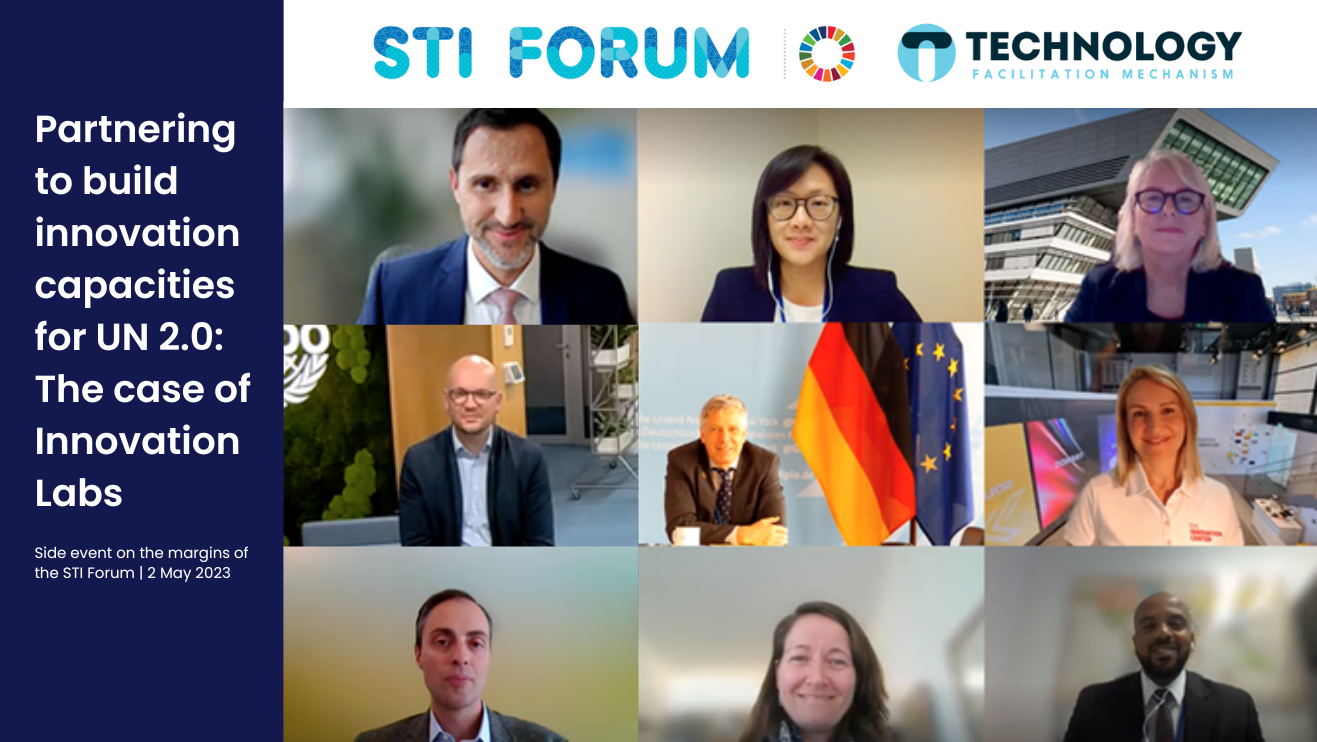Partnering to build innovation capacities
02 May 2023

NEW YORK - There is an urgent need for multi-stakeholder collaboration among United Nations entities, Member States, industry leaders and knowledge institutions to harness cutting-edge innovation strategies towards a UN 2.0, as a centrepiece of the Secretary-General’s Common Agenda. This was one of the key messages emerging from the event organized by the United Nations Industrial Development Organization (UNIDO), jointly with the United Nations Global Pulse and the Permanent Mission of Germany in New York, on the margins of the 8th Multi-stakeholder Forum on Science, Technology, and Innovation (STI Forum) for the Sustainable Development Goals (SDGs).
Titled “Partnering to build innovation capacities for UN 2.0: The case of Innovation Labs”, the event was co-hosted by the Permanent Missions of Austria and Ethiopia in their capacity as co-chairs of the Group of Friends of Inclusive and Sustainable Industrial Development in New York.
The discussion focused the link between the innovation pillar of the UN 2.0 Quintet of Change and achieving the ambitious 2030 Agenda for Sustainable Development. The speakers drew on their own experiences to emphasize the potential of multi-stakeholder partnerships, including the example of the recently established UNIDO Innovation Lab. “At UNIDO we embrace innovation as a tool for progress and to find concrete solutions,” highlighted UNIDO Director General Gerd Müller in his remarks.
“We are really at the midpoint of the 2030 Agenda. So, this is a crucial moment to take stock,” emphasized Thomas Zahneisen, Ambassador and Deputy Permanent Representative of Germany to the United Nations in New York. The Ambassador acknowledged the sobering report on the progress of the SDGs and highlighted the need to focus on fostering STI for a modern United Nations – one that is better able to assist Member States in navigating the opportunities and challenges of the twenty-first century. “Now is the time to make a difference in the United Nations system, and I think UNIDO has an important role to play in the process.”
“Collaboration, skills development and innovation are crucial for a UN 2.0, as they will enable us to leverage data, strategic foresight and behavioural science to enhance effectiveness and develop innovative solutions for a better future,” noted Ayaka Suzuki, Director of the Strategic Planning and Monitoring Unit in the Executive Office of the Secretary-General, setting the scene for the panel discussion. Suzuki also emphasized the significance of the partnership between Global Pulse and UNIDO through the UNIDO Innovation Lab.
Global Pulse’s Patricia Loh highlighted three key elements to advancing a UN 2.0: ambidexterity – operating in two complementary modes, continuing operations while innovating; scaling innovations – moving from experimentation to creating impact through widespread adoption; and fostering value networks of diverse stakeholders. “Given the complex challenges of our times, we cannot do this alone, and we’ll need value networks of stakeholders who bring diverse perspectives.”
Bringing in the private sector perspective, Irina Albanese, DHL’s Head of Innovation for the Middle East and Africa, talked about the importance of tapping into a network of talent and technology partners, rather than trying to develop all solutions in-house. “We must understand customer needs and look to other industries for inspiration. Collaboration drives innovation.”
Academia also has an important role to play. “The biggest asset of academia is probably its ability to generate and disseminate knowledge. We play a crucial role in researching and developing new ideas, technologies and processes that can address the challenges facing the UN system”, remarked Edeltraud Hanappi-Egger, Rector, Vienna University of Economics and Business. She noted that students are also increasingly seeking to engage in social entrepreneurship within innovation systems, and to contribute to purposeful projects that tackle global challenges.
Against this backdrop, UNIDO’s Innovation Lab Manager, Adnan Seric, spoke about the need for the organizational culture to invest in innovation, to create supportive policies and procedures, and to leverage technology and innovation labs, which “serve as platforms that can amplify and ensure that these innovative practices are mainstreamed throughout an organization”. He expanded on the scope of the UNIDO Innovation Lab, which provides a unique space for UNIDO teams to experiment and collaborate, moving away from linear project implementation and embracing a more user-centric approach through its incubator programme.
Dalai Fazio, Senior Manager of Multilateral Finance and Development at Deloitte, spoke about his experience with the company’s more than 30 physical innovation spaces, called “greenhouse labs”, worldwide. Agreeing with the thread of the panel discussion, he noted: “Innovation centres of excellence should tap into the marketplace for tools, talent and technology, involving a broader population to address unique challenges. There needs to be cultural permission that allows people to redefine their roles and decouple their tasks from their value in the organization.”
UNIDO’s Ralf Bredel, Director and Representative to the United Nations in New York, and moderator of the event, wrapped up with three key takeaways: First, it is crucial to tap into the expertise and experiences of different stakeholders. By forming lasting partnerships and bringing existing solutions to the system, organizations can avoid reinventing the wheel. Second, the ultimate aim of advancing innovation efforts within the United Nations must be improved service delivery to Member States, particularly in developing countries, and progress towards this must be continuously measured and tracked. Third, innovation labs are promising tools for bundling innovation efforts and building a culture of innovation within organizations. These labs should be embedded in ongoing discussions as the United Nations progresses towards UN 2.0.
The outcomes of the STI Forum will serve as input to the High-Level Political Forum on Sustainable Development, which, among other activities, is conducting a comprehensive review of SDG 9 on industry, innovation and infrastructure in 2023, reflecting UNIDO’s mandate.
For more information, contact:
Ralf Bredel, UNIDO Director and Representative to the UN in New York
Adnan Seric, Manager, Innovation Lab, Office of the UNIDO Director General